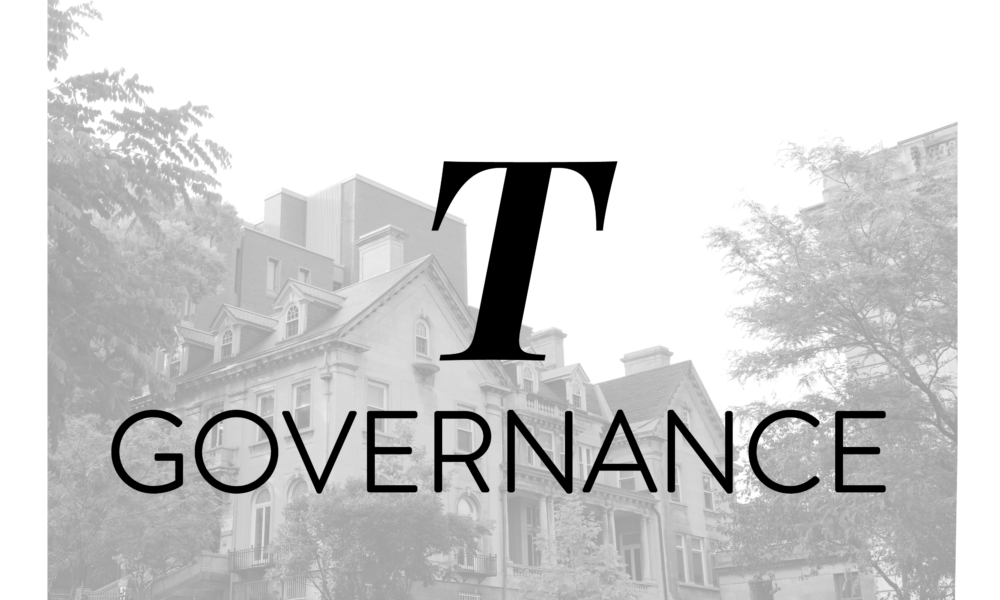The McGill Board of Governors (BoG) convened for its first meeting of the 2024-25 academic year on Oct. 9. The board discussed enrolment, an update from the Committee on Sustainability and Social Responsibility (CSSR), and the university’s communications strategy.
The first and last portions of the meeting were not open to the public. The open session of the meeting began with remarks from McGill President and Vice-Chancellor Deep Saini, who focused on the encouraging enrolment statistics for the 2024-25 academic year.
“Enrolment […] is a good news story this year, despite the fears that we had last year when the government introduced a new funding framework for universities, as well as new measures on tuition at the university,” Saini said. “Enrolment is either comparable to last year or up in all faculties across the board in the university, with the largest growth occurring in Science, Desautels, and Engineering.”
He also noted that the number of students from CEGEPs enrolled in bachelor’s degrees at McGill increased by 5.2 per cent, and new registrations from out-of-province Canadian high school students increased by 11 per cent.
Despite these increases in enrolment, Saini expressed concern about Canada’s continued tightening of regulations around international students, specifically the 10 per cent reduction in the number of study permits issued across Canada for 2025. He pointed out that masters and doctoral students, previously exempt, are now subject to this reduction.
“This has introduced a new hurdle for our ability to attract top-tier talent [at] the graduate level, where global competition is already very fierce,” Saini warned.
Saini added that McGill was cooperating with other research institutions like Université Laval and the Université de Montréal to advocate for fewer restrictions that impact enrolment at Quebec universities.
Following Saini’s introduction, Regional Vice President of Private Banking for Quebec and Eastern Canada and Chair of the CSSR Alan Desnoyers presented a report from his committee. Desnoyers noted that during committee meetings on Aug. 29 and Oct. 2, the CSSR had discussed McGill community members’ concern around the university’s investment in companies complicit in the Israeli genocide of Palestinians in Gaza. Desnoyers also explained that the CSSR is consulting the McGill community on the possibility of a broader divestment from weapons manufacturers through a webform which was available for people to fill out until Oct. 1.
“The committee agreed to launch a broad consultation process with the McGill community concerning the question of divestment from direct investments in companies that derive a dominant portion of their direct revenues from the production of military weapons, regardless of the countries in which they operate,” Desnoyers noted.
Philippe Gervais, who has served as Vice-President of Communications and Institutional Relations since Aug. 1, outlined his plans for re-organizing the university’s communications staff, such as separating the previously combined “Issues Management” and “Content Production” teams. He also plans to integrate AI-assisted translation to reduce the burden of labour for the translation staff.
Gervais also discussed how McGill is responding to the Quebec government’s mandated tuition increases, and highlighted that these new measures require 80 per cent of non-Quebec students to achieve a Level 5 proficiency in French. Gervais stated that the university is trying to combat the challenges imposed by the new expectations for French proficiency by offering an opportunity to learn a new language over the course of their degree.
Subsequently, the Board approved the 2023-2024 Financial Report, which was verified by an external auditor. The last report was a presentation from the Faculty of Medicine, which gave an overview of the recently opened medical education program at the Outaouais Campus, where the first class of students graduated in spring 2024.
Moment of the meeting:
Saini highlighted McGill’s 2024 Canada Award, which offers up to $12,000 CAD for out-of-province Canadian students entering in 2024-25 academic year, has helped to encourage out-of-province students to enroll despite Quebec’s new fee requirements.
Soundbite:
“We’re looking ahead at a little bit of a rebranded McGill, a little bit of a refresh, bringing it a little bit up to date [….] This will be a long process. It’s not something we can do overnight. It’s not finding a new catchphrase for McGill. There’s a lot of work to be done there.” — Gervais on how he sees McGill’s image developing in the future.







